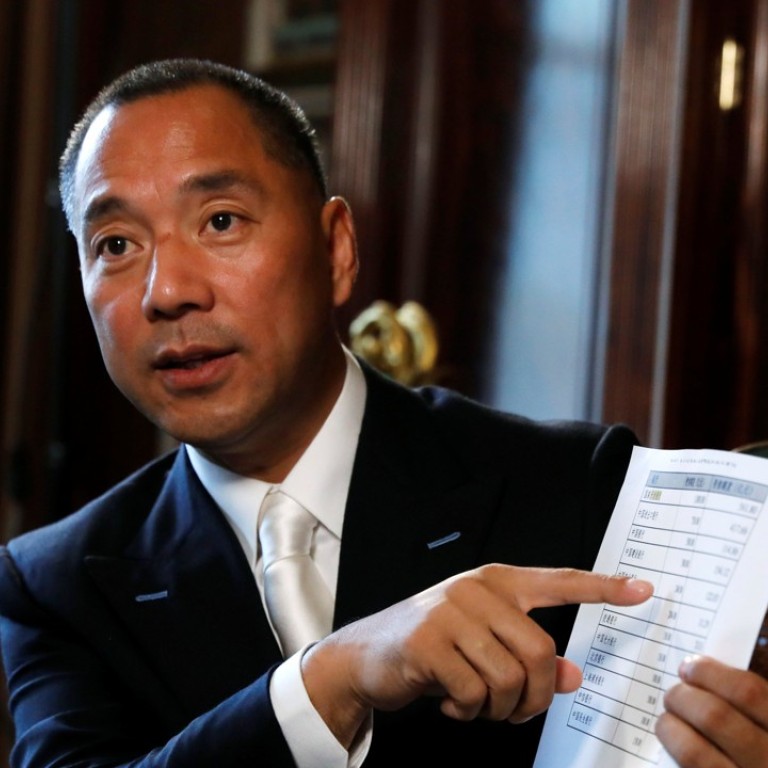
Rape allegations could derail exiled Chinese tycoon Guo Wengui’s US asylum claims, says lawyer representing alleged victim
Guo insists civil claim for damages lodged in New York court is part of smear campaign by mainland authorities after series of corruption accusations
The rape allegations against Guo Wengui, one of China’s most wanted exiles, are a relevant factor affecting the billionaire’s bid to seek political asylum in the US, an American lawyer representing the alleged victim has said.
A civil suit was lodged in New York last week demanding US$140 million in compensation.
The alleged victim, 28, felt unsafe travelling to the US to give evidence against her former boss Guo, her New York-based lawyer, Lisa Solbakken told the South China Morning Post.
“When a government is processing asylum claims, they obviously need to know the character of the person,” Solbakken said, explaining what she said was an “absolutely relevant” link between her case and Guo’s asylum application.
But Solbakken, a business litigation specialist, stressed that she was not involved in asylum matters and they should be considered by the relevant authorities.
Guo’s legal representative in New York, Josh Schiller, hit back at Solbakken’s remarks, calling them “nothing more than a further effort to defame” Guo and “part of a larger scheme by [China] to persecute him until he stops talking”.
Guo, 50, has in recent months unleashed a deluge of sensational, if mostly unverifiable graft accusations against senior Communist Party officials – including anti-corruption tsar Wang Qishan – via Twitter posts.
He has been the target of Chinese law enforcement agencies, which are understood to be preparing for a second red notice to Interpol, effectively a request to locate and provisionally arrest an individual pending extradition. A previous red notice was issued for corruption charges.
No extradition treaty exists between the US and China. The two sides need to engage in bilateral talks to repatriate any overseas fugitives back to their home country.
The last time Solbakken spoke to her client – who once worked for Guo – was Thursday.

According to a recent report by Reuters, Guo insisted that the rape allegation was“fake”. Solbakken denied this by pointing to the victim’s willingness to publicise her name in the civil suit. (The South China Morning Post will not publish her name due to the ongoing criminal investigation in China.)
“She loses some of the protection that might be afforded her if she pursued justice criminally [in the US],” Solbakken said. “Criminally, there is some effort to protect the victim’s identity.”
Guo has claimed the civil charges mounted in the US were orchestrated by Chinese officials. He insisted he was the victim of a smear campaign aimed at stopping his bid for asylum and securing his return to China, although that prospect is less than certain given Guo does not hold any travel documents issued by Chinese authorities.
Solbakken said her client’s interests “are limited to having Mr Guo answer to criminal authorities for his acts, whether these criminal authorities are located in China or New York”.
In response, Schiller, the lawyer for Guo, said: “China wouldn’t have jurisdiction over crimes that allegedly occurred in another country.”
He added that the rape complaint “lacks any actual evidence” and “fails to name a single witness while there would have been numerous witnesses that are constantly around Mr Kwok [Guo also goes by the name Miles Kwok] including his security detail”.
The victim lodged the civil complaint with the New York Supreme Court last Monday, saying she was “lured” by Guo to New York in 2015 under the guise of a one-week business trip.
Instead, Guo “forcibly took away” the woman’s passport, threatened her, monitored her internet usage and restricted access to her phone and laptop computer, according to the suit.

